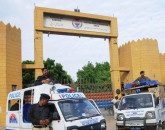Investing in youth, for secure tomorrow
Speakers discuss various topics including plight of Malakand to youth in SDPI conference.

Investing in youth, for secure tomorrow
This topic was among the themes discussed at the Sustainable Development Policy Institute’s 13th Conference in Islamabad on Wednesday.
In the panel “Peace through development”, speakers discussed the plight of Malakand Division, neglect of the affected communities of Rod Kohi in district Rajanpur, and the alienation of Pakistani youth and the difficulties faced by internally displaced persons.
Speaking at the occasion, Fahim Raziq, of College of Youth Activism and Development, said that the youth are instrumental in countering insurgencies. He said, “In the presence of insufficient opportunities there is a need to engage [the youth] in social, civic and economic activities.”
He said that currently only 2 per cent of the youth was taking part in politics which indicates that they are “highly vulnerable” to tactics being used by terrorist groups and other negative influences.
“The issues of young people in societies undergoing transition are deep, complex and multi-faceted. They need a holistic out-of-the-box thinking and approach,” he said.
“To prevent problems, the approach should be to promote development of competencies, skills, and motivation in order to enhance individuals’ pathways,” he added.
Furthermore, a speaker at the conference noted that Malakand Division had faced many adversities such as military operations, floods, land disputes, climate changes and fluctuating strategic interests, which was altering the dynamics of the region negatively.
Improving provision of public services infrastructure, especially educational facilities and ensuring employment to youth, were highlighted as crucial in combating extremism, terrorism and conflicts being faced by the region.
Dr Lubna Chaudhry, of State University of New York, spoke on “Post-conflict voices from the Swat Valley: On Reconstruction and Development from the Bottom-up”. She said that the military was the “most developed” institution in Pakistan.
“When there is an overt military rule, neo-colonial forces work with select members of the ruling class,” she said.
Chaudhry said that genesis of current phase of militarisation and religious militancy was the outcome of 1980s collusion between Ziaul Haq (1977-1988) and US, due to the 1979’s Soviet invasion of Afghanistan. Due to the military rule at the time and its control over the populace, the measures taken had far-reaching consequences.
Moreover, Dr Anita Ghimire from Nepal highlighted the dilemma of Internally Displaced Persons (IDPs). She said that the IDP population was 27.1 million around the world in 2010 (the highest since 1994).
“Around 6.8 million people were displaced only in 2009 in 54 countries of the world,” she said, adding that in Asia alone more than 4.3 million were affected.
“More than half of the new IDPs in Asia are in the Khyber-Pakhtunkhwa province including the Fata region,” said Ghimire. Quoting another figure related to the region she said, “IDP population of Pakistan is sixth highest in the world with 1.2 million, which is 0.2 % of its population.”
She also analysed the situation in Afghanistan, Bangladesh, Myanmar and Nepal. “Durable solutions are linked to sustainable development, and outcomes like opportunities for education, employment and health facilities,” she said.
Published in The Express Tribune, December 23rd, 2010.



















COMMENTS
Comments are moderated and generally will be posted if they are on-topic and not abusive.
For more information, please see our Comments FAQ